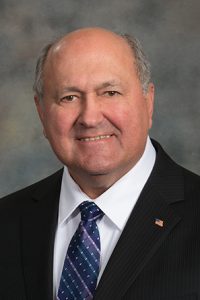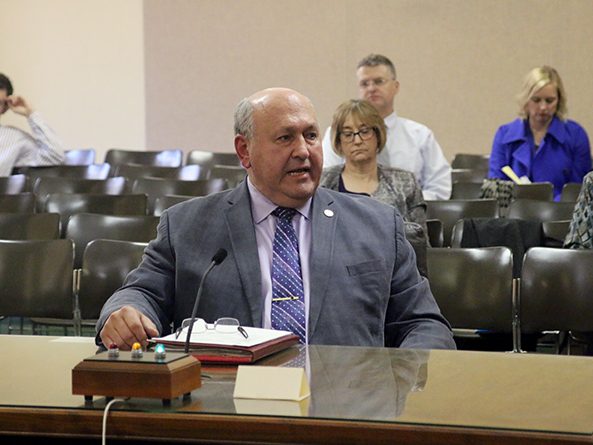Bill would make texting while driving a primary offense
A police officer could stop and ticket a driver solely for texting while driving under a bill heard by the Transportation and Telecommunications Committee Feb. 27.
State law prohibits the use of a handheld wireless communication device to read, type or send a written message while operating a motor vehicle while it is in motion. Currently, the law may be enforced only as a secondary action when a driver has been cited or charged with a traffic violation or some other offense. LB471, sponsored by Omaha Sen. Rick Kolowski, would change enforcement of the law to a primary action.
“This means that law enforcement will be able to pull you over when they see you texting,” Kolowski said.
The bill would lead to increased enforcement of the texting-while-driving ban, he added, protecting property and saving lives, particularly those of teenage drivers.
Rose White, speaking on behalf of AAA and the Auto Club Group, testified in support of the bill, saying that crashes as a result of distracted driving are increasing. More than 35,000 people died in crashes on the nation’s roadways in 2015, she said, and early data for 2016 show an 8 percent increase over 2015. White said 4 in 10 drivers engage in social networking while driving and 75 percent of teens reported that texting while driving is common among their friends.
“We want a law that will simply send a message loud and clear that texting while driving is not acceptable,” she said.
Laurie Klosterboer, executive director of the Nebraska Safety Council, also spoke in support of the bill. In a recent annual survey the council conducted with the Nebraska Department of Roads Highway Safety Office, she said, 89 percent of respondents indicated they would support a primary enforcement law that bans texting while driving.
“The primary law is going to really send the message — not only to the general public — but to law enforcement that we support traffic safety laws in our state and we want people to be focused on driving when they are behind the wheel,” Klosterboer said.
Julie Harris, speaking on behalf of the Nebraska Bicycling Alliance, also testified in support of the bill. She said a 2013 University of Nebraska Medical Center study found a 45 percent increase in fatalities for pedestrians and a 31.5 percent increase in fatalities for bicyclists in Nebraska between 2005 and 2010. As the number of cars on the road and the use of cell phones continue to increase, Harris said, fatalities and injuries among pedestrians, bicyclists and road construction workers also will increase.
“The most vulnerable users on our roads need to be protected,” she said, “and they need to know that we take this law seriously in our state.”
Beverly Reicks, president and CEO of National Safety Council Nebraska, also testified in support. In a recent National Safety Council Poll, she said, 24 percent of teens responded that they had a friend who was injured or killed in a crash caused by a technology-related distraction. Half responded that they still would check social media while driving, one-third said they would text and 1 in 5 said they would text often. Reicks said tougher state laws and better education for young drivers would help address the problem.
“Americans believe that there is nothing we can do to stop crashes from happening, but that is not true,” she said. “We know what needs to be done — we just haven’t done it.”
Testifying in opposition to the bill was Spike Eickholt, speaking on behalf of the Nebraska Criminal Defense Attorneys Association. He said the bill as written would allow police officers to stop drivers just for looking at or touching their phones and would criminalize other things people use their phones for, such as getting directions from an app.
“We would argue that that would just give too much discretion to the officers,” he said.
The committee took no immediate action on the bill.


